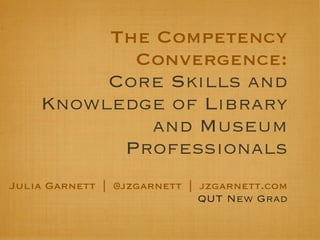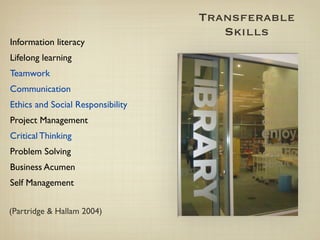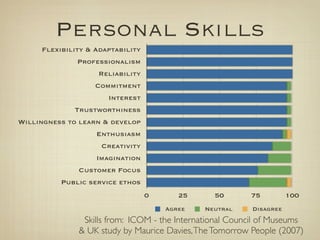The Competency Convergence: Core Skills and Knowledge of Library and Museum Professionals
- 1. The Competency Convergence: Core Skills and Knowledge of Library and Museum Professionals Julia Garnett | @jzgarnett | jzgarnett.com QUT New Grad
- 2. GLAM Impetus for Research Information Professionals Skills and Knowledge How Can We Evolve WhatŌĆÖs Next?
- 3. Galleries | Libraries | Archives | Museums Image: A logo for the GLAM Ambassador Steering Committee. http://outreach.wikimedia.org/wiki/GLAM/Ambassadors_%26_Interns/Steering_Committee
- 4. Background and Impetus for Research An interest in GLAM and modern information roles Paul Marty (USA) believes the library and museum professions have developed similar skills and knowledge Research in the LIS space by Helen Partridge & Gill Hallam (2004 - The Double Helix)
- 5. Background and Impetus for Research No corresponding research or literature was found in the museum space ŌĆ£Museum information professionals are among the least studied of all consumers and producers of museum resources.ŌĆØ - Gilliland-Swetland & White, 2004
- 6. Aims and Objectives To learn more about the GLAM space, especially museums and libraries To discover the skills and knowledge needed for current museum roles To assess the core skills and background knowledge possessed by both museum and library professionals
- 8. Same Same, but Different ŌĆ£Just as LIS professionals have shifted their focus away from the ŌĆśuser in the life of the libraryŌĆÖ to the ŌĆślibrary in the life of the user,ŌĆÖ cultural heritage information professionals have engaged in a similar shift from the ŌĆśvisitor in the life of the museumŌĆÖ to the ŌĆśmuseum in the life of the visitor.ŌĆÖ ŌĆØ - Marty, 2012
- 9. Same Same, but Different ŌĆ£The role of the museum information professional is changing so rapidly that any attempt to de’¼üne precisely the responsibilities with it likely would become quickly outdated, especially if one attempts to specify particular skills or technologies as requirements. In seeking individuals capable of ’¼ülling such a position, then, museum administrators need employees who are just as capable of helping them de’¼üne the very role they need to play in the museum.ŌĆØ - Marty, 2008
- 10. Same Same, but Different ŌĆ£[Cultural heritage institutions] will require new information professionals to look beyond speci’¼üc technical abilities and see how their skills can help their institutionsŌĆÖ users access cultural heritage information resources.ŌĆØ CHIPS Workshop Report, 2008
- 12. The Research Approach Conduct a literature review to collect existing empirical data on library professionals in Australia Undertake online questionnaire of Australian museum professionals Compare ’¼ündings from the literature and questionnaire
- 13. Library Skills & Knowledge Skills and knowledge required in the LIS sector were drawn from existing literature
- 14. Management Generic Collection management and development Skills Information management Information and society Information Organisation Information services Information resources and retrieval Information systems Records management and archives Ethics and legal responsibility Information Services Information literacy instruction Web content management Research
- 15. Transferable Skills Information literacy Lifelong learning Teamwork Communication Ethics and Social Responsibility Project Management Critical Thinking Problem Solving Business Acumen Self Management (Partridge & Hallam 2004)
- 16. Museum Skills & Knowledge Skills and knowledge from North American and British studies formed the basis for the questionnaire
- 17. Personal Skills Flexibility & Adaptability Professionalism Reliability Commitment Interest Trustworthiness Willingness to learn & develop Enthusiasm Creativity Imagination Customer Focus Public service ethos 0 25 50 75 100 Agree Neutral Disagree Skills from: ICOM - the International Council of Museums & UK study by Maurice Davies, The Tomorrow People (2007)
- 18. Generic Skills Commitment Teamwork Critical Thinking Written Communication Oral Communication Computer Skills Interpersonal Leadership Social Media Skills 0 25 50 75 100 Agree Neutral Disagree Skills from: ICOM - the International Council of Museums & UK study by Maurice Davies, The Tomorrow People (2007)
- 19. Discipline Knowledge Interpretation Collections Management Curatorial Practice Knowledge of Standards Visitor Response & Engagement Exhibition Development Financial Management 0 25 50 75 100 Agree Neutral Disagree Skills from: ICOM - the International Council of Museums & UK study by Maurice Davies, The Tomorrow People (2007)
- 20. Discipline Knowledge Knowledge of Standards Vistitor Response & Engagement Legal & Copyright Social & Political COntexts Visitor Services & Public Museum Theory Research Methods Conservation Education Publications & Products 0 25 50 75 100 Agree Neutral Disagree Skills from: ICOM - the International Council of Museums & UK study by Maurice Davies, The Tomorrow People (2007)
- 21. How Can We Evolve?
- 22. Evolve Your Thinking Can a museum information professional gain employment in a library? Libraries emphasise quali’¼ücations Professional bodies Skills and knowledge are applicable
- 23. Evolve Your Thinking Can a library information professional gain employment in a museum? Museums emphasise experience Volunteering and internships Skills and knowledge are applicable
- 24. Evolve Your Approach Both Libraries and Museums are under stress Budget Technology User Needs
- 25. Evolve Your Profession Both Libraries and Museums are responding Changing role of Information Professionals Cultural Institution Convergence Accreditation and Education
- 26. WhatŌĆÖs Next? other arms of GLAM? multi-skilled professionals education and training professional development collaboration
- 27. Any Questions?
Editor's Notes
- #2: \n
- #3: \n
- #4: In the early 1800s, libraries, museums and galleries were often housed in one building, and there was very little separation. With the onset of digital collections and objects, cultural institutions may blur the lines between libraries and museums. Natural History Museums with a library\nIn North America, “Gallery” is often incorporated into what we know as a Museum, so some American and Canadian papers will refer to the group as LAM.\n
- #5: Marty is quite prolific and respected in the field of information studies. Since the early 2000s, he has published several papers that evaluate the museum profession. Marty holds a PhD in Library and Information Science from the University of Illinois.\nThe Double Helix asked, What are the generic capabilities required by the Library and Information Professional for the twenty-first century? \n and What is the discipline knowledge required by the Library and information Professional for the twenty-first century? so I have taken these concepts and applied them to museum information professionals.\nCentral Institute of Technology Library : suspended sculpture made of weeded book pages.\n\n\n
- #6: My research will address a gap in the literature. Its scope is not as broad as I would like but it’s a place to start.\n(Gilliland-Swetland & White, as cited in Marty, 2008)\n
- #7: I hope to contribute to the field of information studies. Since the 1990s there has been a rise in literature focused on the GLAM space. By assessing the core skills and knowledge of museum and library professionals, I hope to uncover any parallel skills, and open up discussion for collaborative projects and staff exchanges between cultural institutions in the future.\n
- #8: \n
- #9: \n
- #10: \n
- #11: \n
- #12: \n
- #13: My methodology involved survey research, with a questionnaire as the data collection method. The questionnaire included qualitative and quantitative questions, a demographic section, and a likert scale with a matrix of skills and knowledge for respondents to rank.\n\n
- #14: \n
- #15: \n
- #16: \n
- #17: The open-ended questions were drawn from Marty (2006 Meeting User Needs), in which the author considers the results of a series of interviews. Open-ended questions were deemed necessary for the survey of museum professionals, in order to obtain qualitative and explanatory responses.\nSkills lists were collated from a number of sources, including ICOM - the International Council of Museums, which is the equivalent of ALIA, a UK study by Maurice Davies called The Tomorrow People: Entry into the Museum Workforce, and Partridge & Hallam’s Double Helix paper.\nI pulled common skills and narrowed them down to a total of 35. These 35 were split into three categories: Personal Skills, Generic/Transferable/Soft Skills, and Disciplinary Knowledge. The categories came from Partridge & Hallam’s Double Helix paper, and were chosen for clarity and ease of classification. Partridge & Hallam surveyed South East Queensland library and information (LIS) professionals in 2004, which provided an excellent starting point for my research. I chose to send a questionnaire because I wanted to reach a wider audience than S.E. QLD. I did however limit respondents to Australia.\n
- #18: \n
- #19: \n
- #20: \n
- #21: \n
- #22: \n
- #23: \n
- #24: 48% of my respondents had volunteer experience in a museum\n
- #25: \n
- #26: \n
- #27: \n
- #28: \n









![Same Same, but Different
ŌĆ£[Cultural heritage institutions] will require new
information professionals to look beyond
speci’¼üc technical abilities and see how their
skills can help their institutionsŌĆÖ users access
cultural heritage information resources.ŌĆØ
CHIPS Workshop Report, 2008](https://image.slidesharecdn.com/competencyconvergencejgarnettpreso-121121165828-phpapp01/85/The-Competency-Convergence-Core-Skills-and-Knowledge-of-Library-and-Museum-Professionals-10-320.jpg)
















